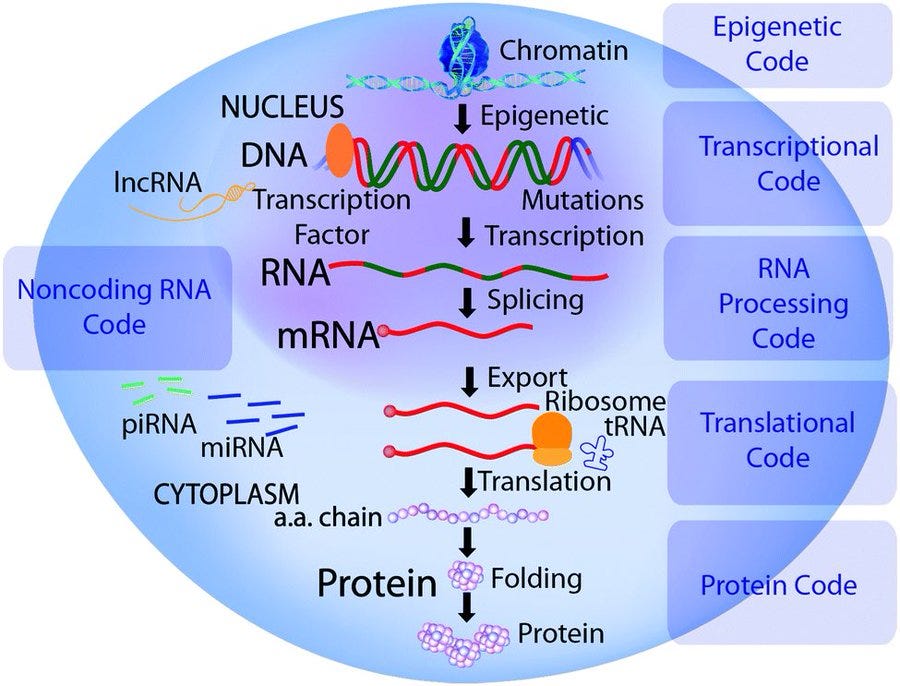Grafting Precision in mRNA Technology: Mitigation and Eradication of Risks
Signal-Based Medicine | mRNA Technology
The diagram provided below illustrates the intricate process of mRNA function within cellular environments, from DNA transcription to protein synthesis. This visual underscores the necessity for precision in mRNA technologies, especially as we aim to reengineer these for safer, more effective medical applications. This post discusses the shift from broad mRNA applications to precision-based, individualized therapeutics, emphasizing safety, long-term impact, and molecular fidelity.
I. Key Challenges Necessitating Reengineering
1. HLA Gene Disruption: Current mRNA platforms have been shown to alter HLA gene expression, potentially triggering autoimmune dysregulation by disrupting the immune system’s ability to recognize self from non-self.
2. Synthetic Element Aberrations: Unregulated delivery of synthetic constructs and molecular debris disrupts natural molecular pathways, causing toxicity, immune overload, and long-term damage.
3. Destabilization of mRNA Transcription: Environmental factors, like ROS and molecular debris formation, can destabilize mRNA transcription, resulting in erratic protein expression and signaling errors.
4. Generational Impacts: Foreign element destabilization and aberrant molecular modifications elevate the risk of cascading effects across generations, raising significant ethical concerns.
II. Strategic Engineering for Mitigation and Eradication of Risks
To tackle these challenges, the following engineering strategies are crucial:
1. Molecular Signal Calibration: Fine-tuning mRNA payloads to ensure precise transcription and translation, thereby minimizing disruptions.
2. Directional Patient-Matched Peptide Coding: Enhance mRNA technology by improving its precision and targeting. By designing peptides engineered to an individual’s genetic transcript and protein profile, this approach ensures more effective delivery and activation of therapeutic mRNA, minimizing off-target effects. It allows for better regulation of immune responses and protein production, ultimately increasing the safety and efficacy of mRNA-based treatments.
3. Real-Time Feedback Systems: Implementing RNA transcriptomics for real-time monitoring and dynamic adjustment of mRNA function.
4. Defensive Engineering Against Foreign Synthetic Element Constructs: Identify, Mitigate, and Eradicate (IME) foreign molecular debris (i.e., Spike Protein) persistence and integration risks while ensuring protein coding fidelity. This will assist in the development of Peptide-Driven Fail-Safes (PDFS), Which Integrate patient-specific peptides to correct molecular aberrant signals and prevent unintended effects.
III. Neo7Bioscience’s Approach to mRNA Precision
At Neo7Bioscience, we aim to revolutionize mRNA technology through:
- Precision-Based Immunomolecular Augmentation (PBIMA): Crafting patient-specific molecular scaffolds.
- Adaptive Algorithms: Ensuring mRNA constructs align with individual patient profiles.
- Advanced Surveillance: Real-time therapeutic outcome monitoring.
-Personalized Therapeutic Targeting: Utilizing individual molecular profiles for tailored treatments, minimizing risks, and maximizing therapeutic outcomes.
Our mission is to address and rectify the inherent risks in current mRNA technologies, promoting safer, more effective, and ethically sound interventions uniquely tailored to each patient. Exciting things are on the horizon! Stay tuned for groundbreaking news on the collaboration between Neo7Bioscience and the University of North Texas Genomics and Biosciences as we unveil cutting-edge advancements in spike detection, embedding, and mitigation!
Further reading:
Contact:



